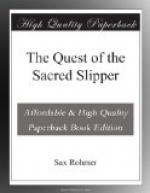No word had been spoken since we had discovered this door; none had been necessary. For we both knew that the place beyond was that from which proceeded the mysterious red light.
I directed the ray of the electric torch upon Carneta, as she stood there listening, and against that sombre oaken background her face and profile stood out with startling beauty. She seemed half perplexed and half fearful. Then she abruptly removed the apparatus, and, stooping to the knapsack, replaced it and took out a bunch of wire keys, signing to me to hand her the lamp.
As I crept down the steps I saw her pause, glancing back over her shoulder toward the door. The expression upon her face induced me to direct the light in the same direction.
Why neither of us had observed the fact before I cannot conjecture; but a key was in the lock!
Perhaps the traffic of the night afforded no more dramatic moment than this. The house which we were come prepared burglariously to enter was thrown open, it would seem, to us, inviting our inspection!
Looking back upon that moment, it seems almost incredible that the sight of a key in a lock should have so thrilled me. But at the time I perceived something sinister in this failure of the Lord of the Hashishin to close his doors to intruders. That Carneta shared my doubts and fears was to be read in her face; but her training had been peculiar, I learned, and such as establishes a surprising resoluteness of character.
Quite noiselessly she turned the key, and holding a dainty pocket revolver in her hand, pushed the door open slowly!
An odour, sickly sweet and vaguely familiar, was borne to my nostrils. Carneta became outlined in dim, reddish light. Bending forward slightly, she entered the room, and I, with muscles tensed nervously, advanced and stood beside her.
I perceived that this was a cellar; indeed, I doubt not that in some past age it had served as a dungeon. From the stone roof hung the first evidence of Eastern occupation which the Gate House had yielded; in the form of an Oriental lantern, or fanoos, of rose-coloured waxed paper upon a copper frame. Its vague light revealed the interior of the hideous place upon whose threshold we stood.
Straight before us, deep set in the stone wall, was the tiny square window, iron-barred without, and glazed with red glass, the light from which had so deeply mystified us. Within a niche in the wall, a little to the left of the window, rested an object which, at that moment, claimed our undivided attention the sight of which so wrought upon us that temporarily all else was forgotten.
It was the red slipper of the Prophet!
“My God!” whispered Carneta—“my God!”—and clutched at me, swaying dizzily.
A few inches from our feet the floor became depressed, how deeply I could not determine, for it was filled with water, water filthy and slimy! The strange, nauseating odour had grown all but unsupportable; it seemingly proceeded from this fetid pool which, occupying the floor of the dungeon, offered a barrier, since its depth was unknown, of fully twelve feet between ourselves and the farther wall.




